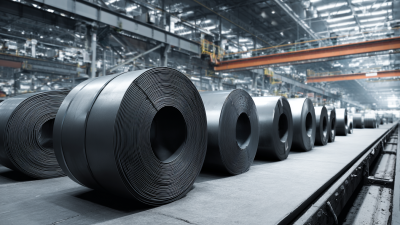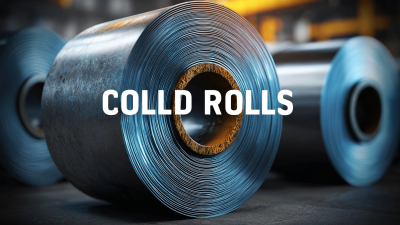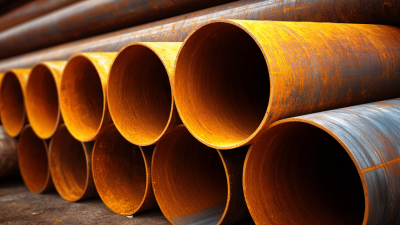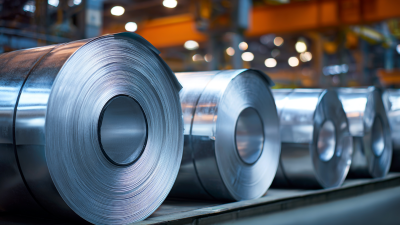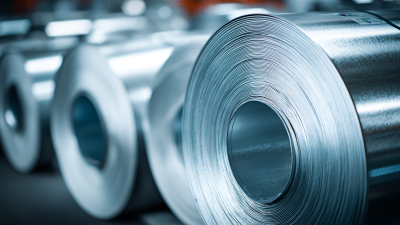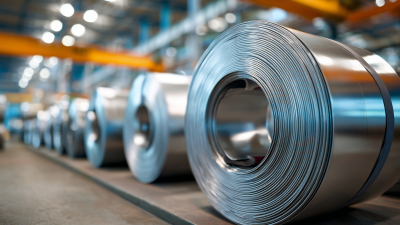In the ever-evolving industrial landscape of 2023, sourcing high-quality carbon pipe has become a crucial factor for businesses aiming to optimize their operations and ensure long-term success. Carbon pipe, known for its strength, durability, and versatility, is a fundamental component in various sectors, including construction, manufacturing, and energy. However, not all carbon pipes are created equal, and navigating the market to find reliable suppliers can be a daunting task.

In this blog, we will explore six effective tips that can guide you through the selection process, ensuring you obtain the best quality carbon pipe that meets your specific needs. Whether you’re a seasoned professional or new to the industry, these insights will equip you with the knowledge necessary to make informed decisions and avoid common pitfalls, ultimately enhancing your project's efficiency and effectiveness.
In 2023, the importance of sourcing quality carbon pipe has never been more critical, especially as industries pivot towards sustainability and efficiency. According to a recent report by the Global Carbon Steel Pipe Market, the demand for carbon pipes is projected to reach 50 million tons by the end of the year, growing at a CAGR of 5.2%. This surge underscores the necessity for manufacturers to focus not just on quantity but also on the quality of materials to ensure that they meet rigorous industry standards and performance demands.
Quality sourcing of carbon pipes directly influences operational efficiency and the longevity of installations. A study by the American Society for Testing and Materials (ASTM) found that inferior quality materials can lead to a staggering increase of 30% in maintenance costs over the lifespan of a project. Additionally, with rising regulations aimed at reducing carbon footprints, sourcing high-quality carbon pipe that meets environmental standards is essential for compliance and corporate responsibility.
In light of these factors, strategic sourcing has become an integral part of supply chain management, directly impacting profitability and sustainability.
When sourcing quality carbon pipe products in 2023, identifying reliable suppliers is crucial to ensuring you receive the best materials for your projects. Start by researching potential suppliers extensively; look for companies with a solid reputation in the industry, positive customer reviews, and a history of reliability. Industry certifications and compliance with standards can also be significant indicators of a supplier's credibility. Attend trade shows or industry events to meet suppliers face-to-face and assess their capabilities directly.

Additionally, consider the supplier's manufacturing processes. A reliable supplier should be transparent about their production methods and have quality control measures in place. Requesting samples can also be an effective way to evaluate the craftsmanship of their products before making a larger commitment. Lastly, establish a strong line of communication with potential suppliers; open dialogue will allow you to address any concerns and assess their customer service and responsiveness. By following these guidelines, you can build a solid foundation for sourcing high-quality carbon pipe products that meet your project requirements.
When sourcing quality carbon pipe, one of the most critical aspects to consider is the specifications of the material. Carbon pipes come in various grades and specifications, each designed to cater to specific applications. Start by identifying the standard grades of carbon pipe relevant to your project, such as ASTM A106 for seamless pipes or ASTM A53 for welded pipes. Understanding the tensile strength, yield strength, and hardness of these materials will help ensure that you select a pipe suitable for the operational conditions it will encounter.
Another essential factor to evaluate is the dimensional accuracy of the carbon pipe. Specifications like wall thickness, outer diameter, and length should align with your project's requirements. Additionally, consider the manufacturing processes and whether the pipe has undergone various treatments, such as heat treatment or surface coating, to enhance its durability and resistance to corrosion. Evaluating these specifications closely not only ensures compliance with industry standards but also promotes optimal performance and longevity in your applications.
In 2023, leveraging technology has become crucial for sourcing quality carbon pipe efficiently. According to a report by the Global Carbon Pipe Market Analysis, the industry is projected to grow at a CAGR of 3.5%, with advancements in technology playing a key role in enhancing procurement processes. By utilizing automated inventory management systems and data analytics, companies can streamline operations, ensuring they select high-quality suppliers while minimizing lead times.
Furthermore, the integration of artificial intelligence (AI) and machine learning (ML) in supplier evaluation has transformed sourcing strategies. A study by the International Association of Pipe Fabricators revealed that businesses employing these technologies reported a 20% increase in supplier reliability and a reduction in procurement costs by 15%. Implementing these technological tools not only fosters better decision-making but also enhances transparency in the sourcing process, allowing firms to quickly adapt to market changes while maintaining high standards of quality in their carbon pipe supplies.
When sourcing quality carbon pipes in 2023, ensuring compliance with industry standards and certifications is crucial for both the safety and reliability of your operations. The market is flooded with manufacturers, but not all meet the stringent requirements set forth by regulatory bodies. Familiarizing yourself with the relevant standards, such as ASTM, ASME, and ISO certifications, is your first step in identifying reputable suppliers. These certifications not only demonstrate a manufacturer’s commitment to quality but also assure that the pipes have been rigorously tested and meet performance expectations.

In addition to understanding the necessary certifications, it's vital to verify that your suppliers maintain these standards throughout their production processes. Frequent audits and a quality assurance program can provide additional confidence in their ability to deliver compliant products. By prioritizing suppliers with a proven track record of adherence to industry regulations, you can mitigate risks associated with non-compliant materials, ensuring that your projects are built on a foundation of excellence and safety.
